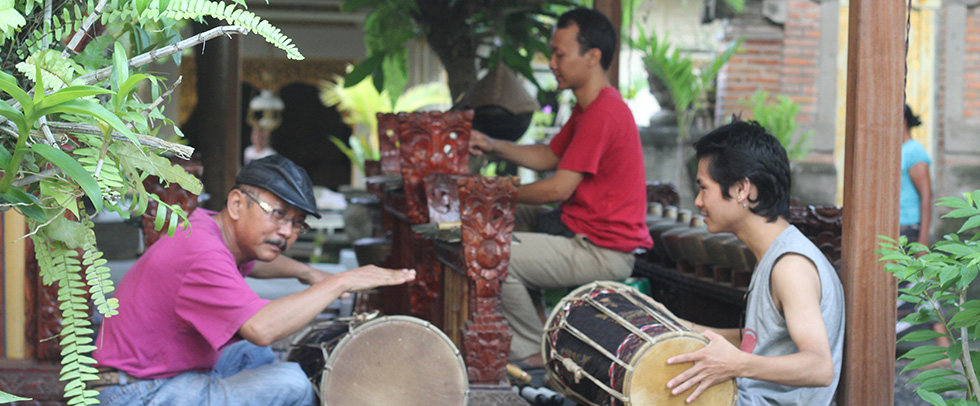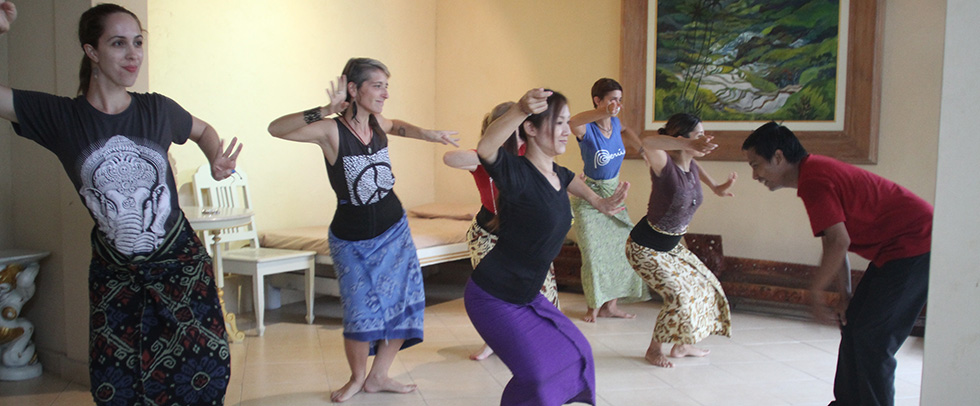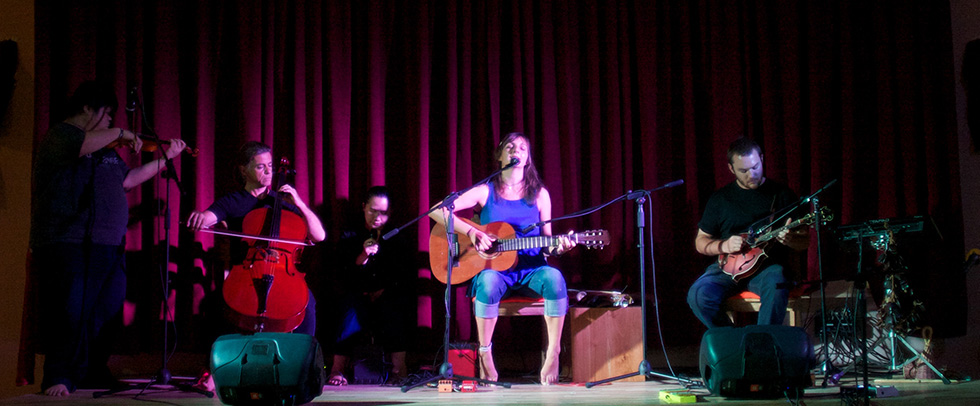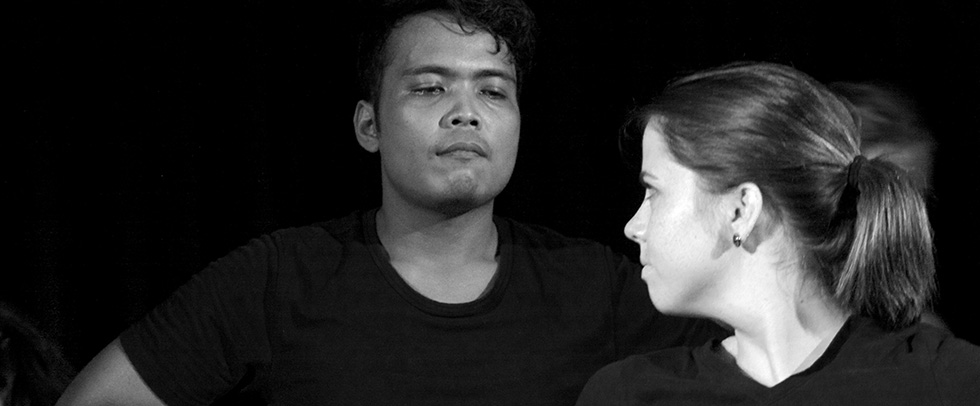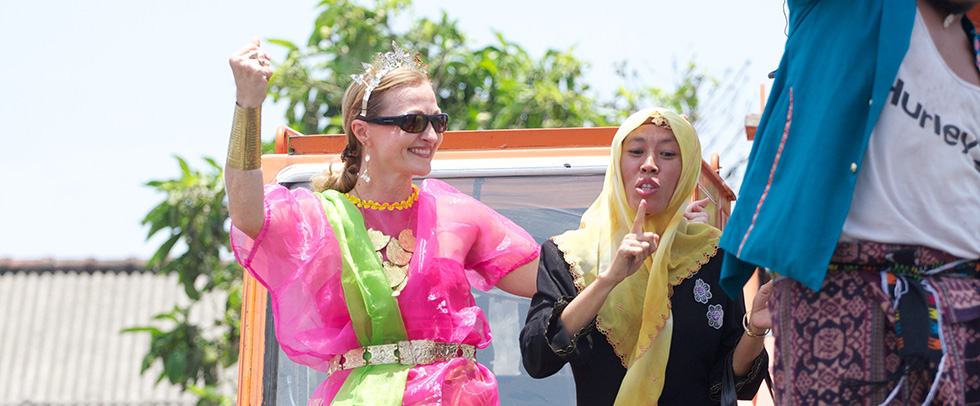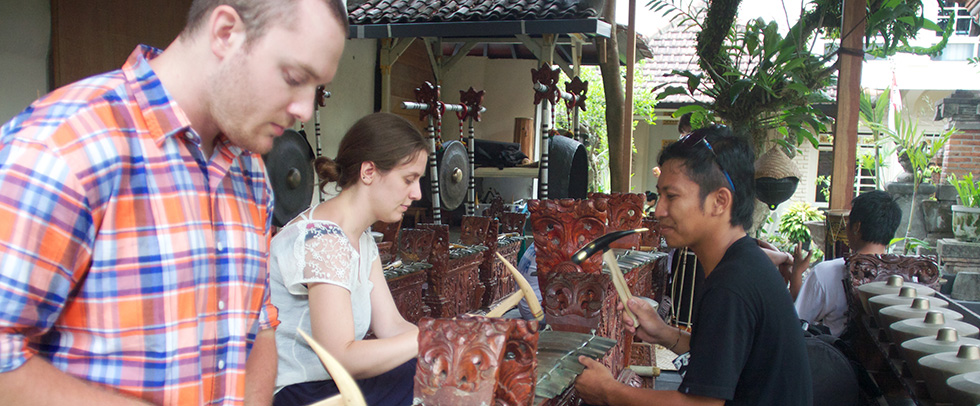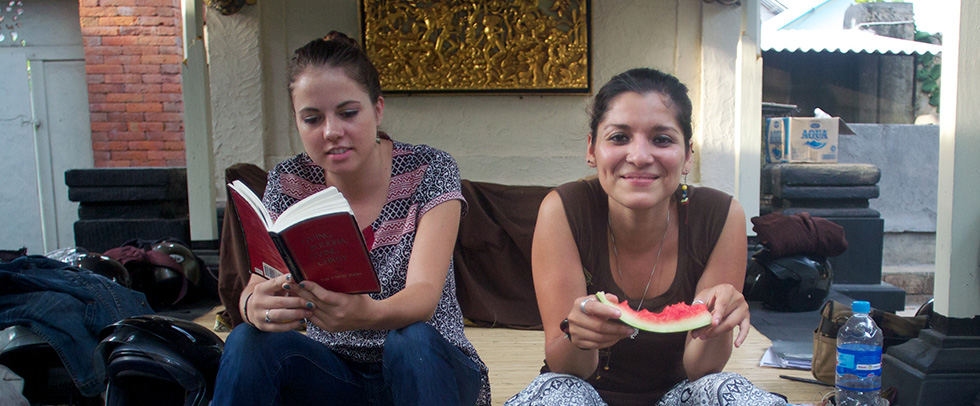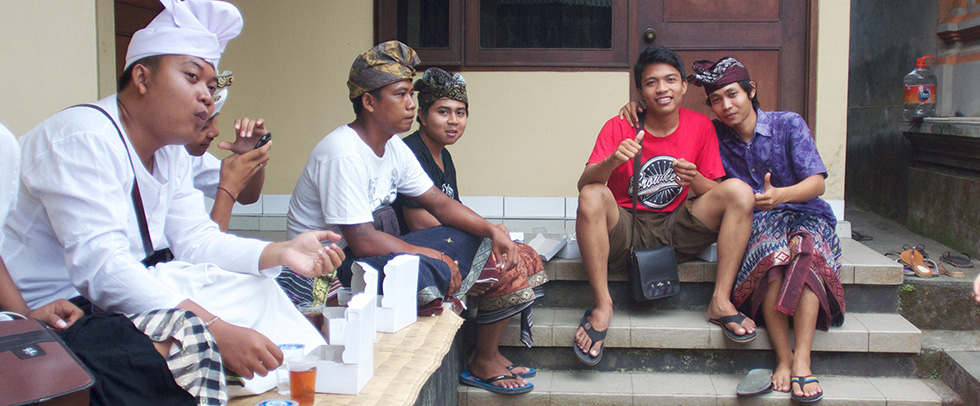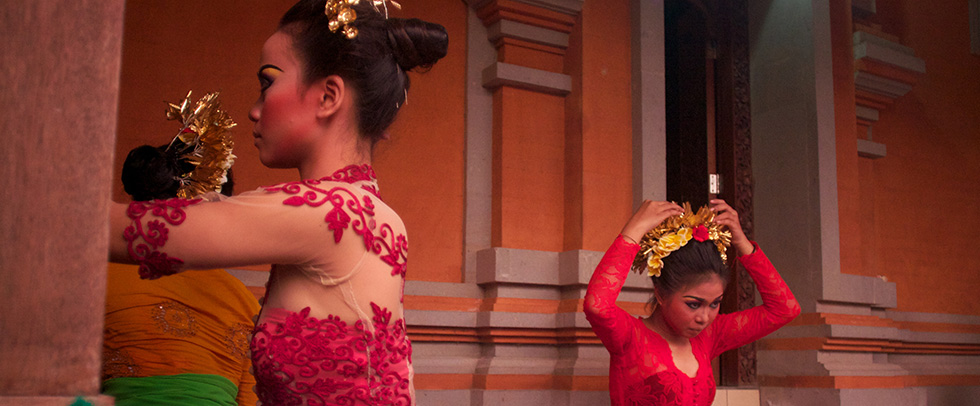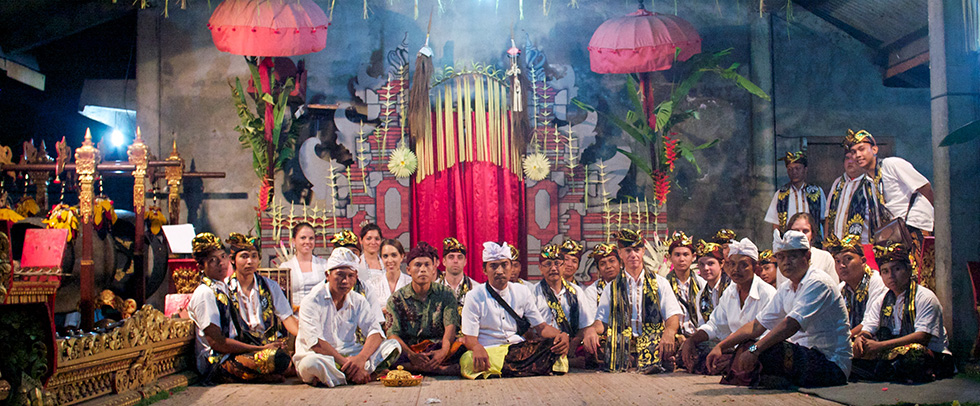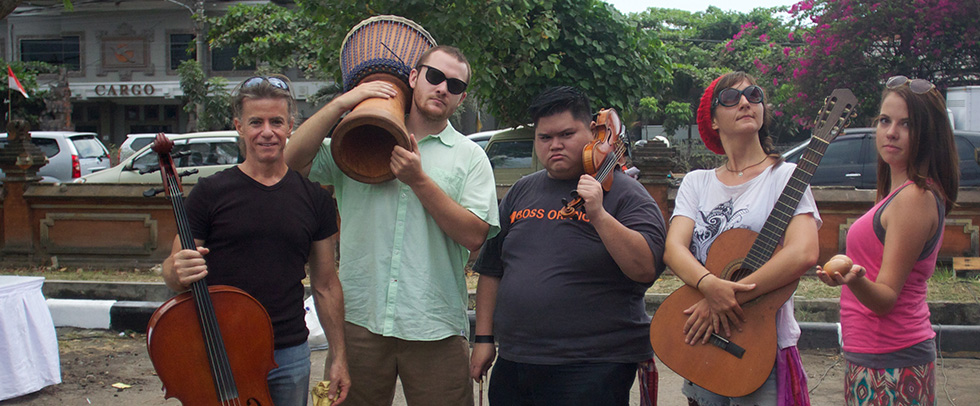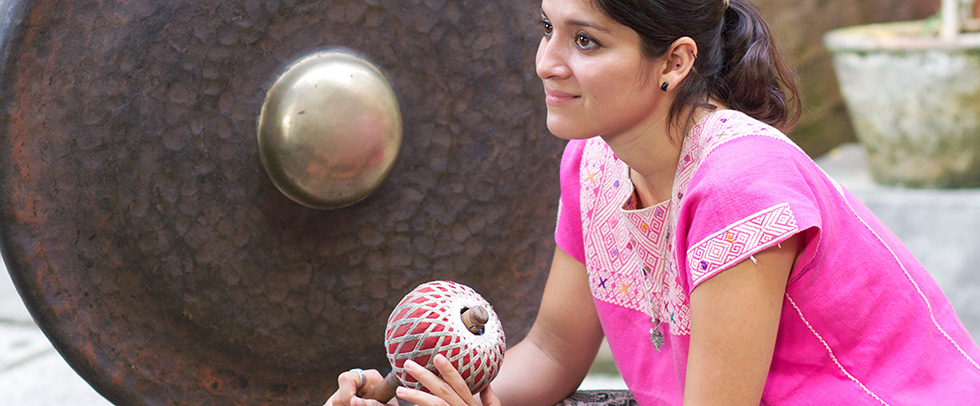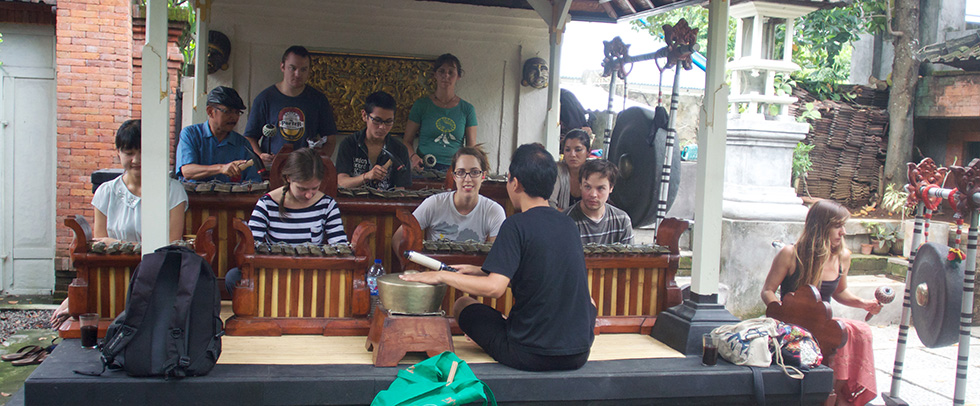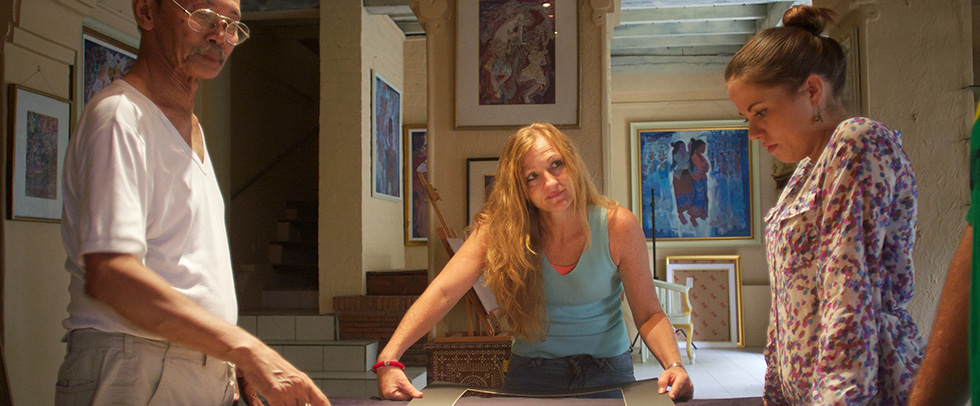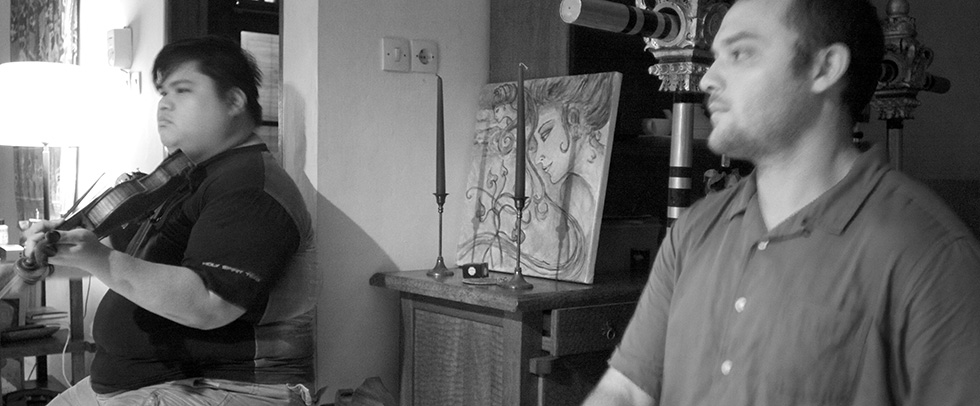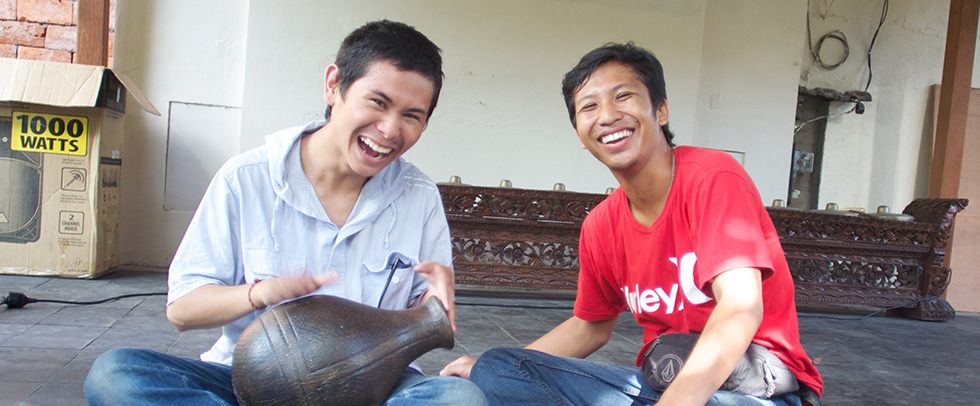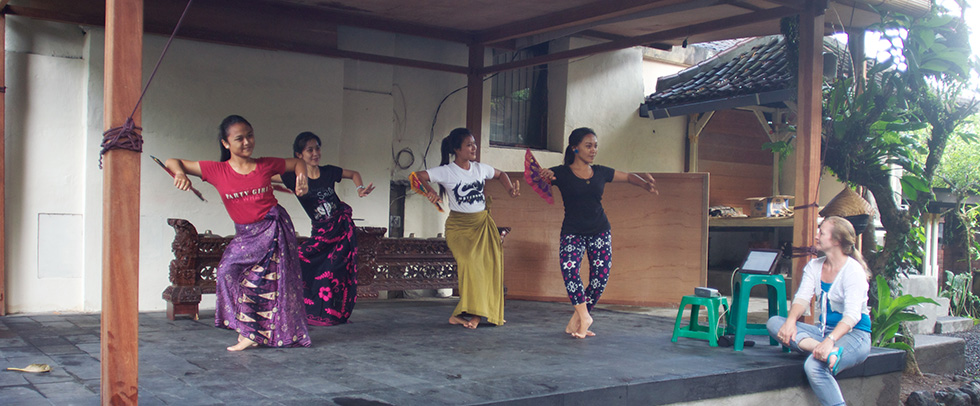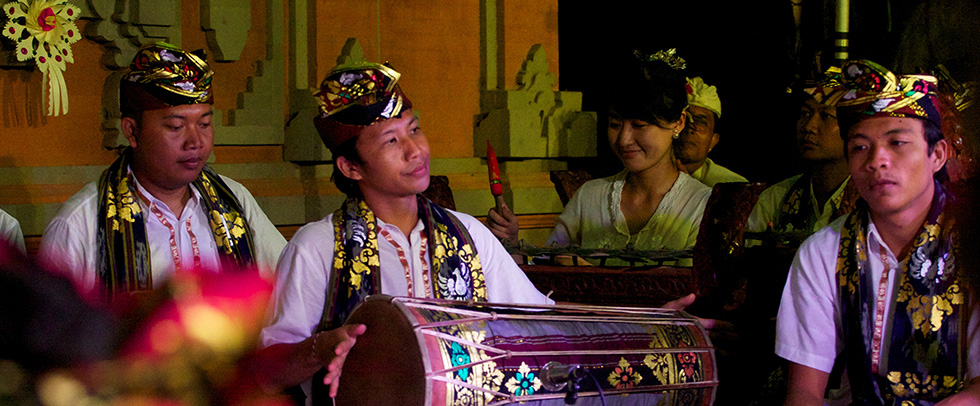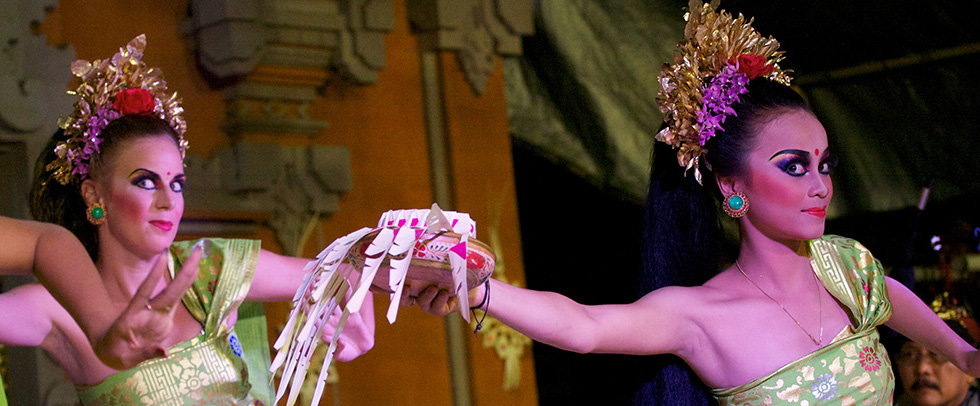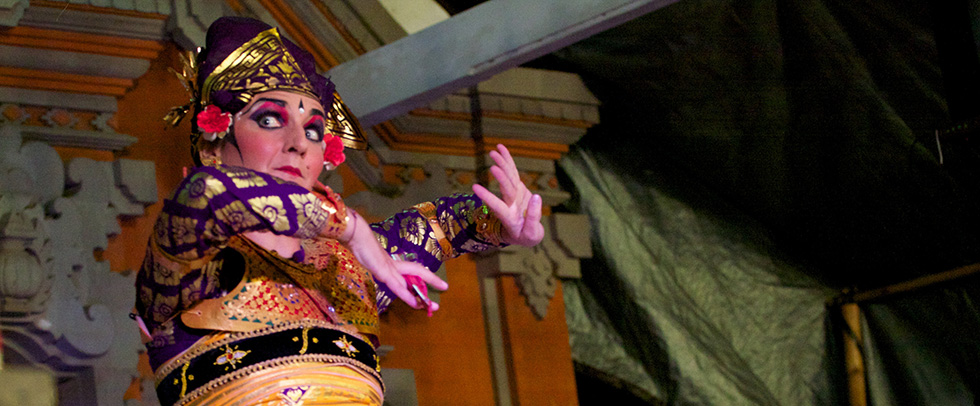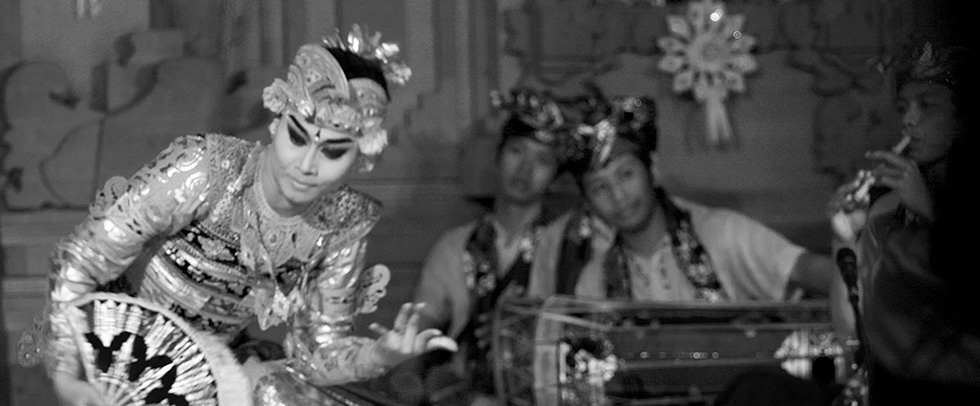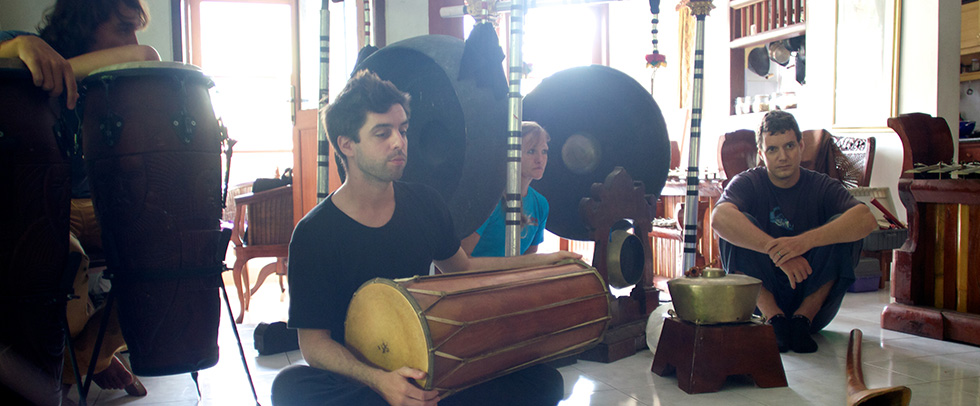- Home
- | What We Do
What We Do
Narwastu has several learning and performing groups. Some are consistent with a continual schedule. Others are based on interest and performance invitations. We're alway open to having new members if there is space.
Gong Kebyar
Balinese music is played on an ancient ensemble of pentatonic percussion instruments called gamelan. The Narwastu Art Community has a complete kebyar type gamelan made up of 25 instruments. It is played in sacred and secular settings and accompanies the traditional dances of Bali. It uses a five-tone system of notes played with enormous changes in tempo and dynamics. Narwastu has a complete ensemble of kebyar instruments built in 1993 in Klunkung. The gamelan is situated at the Narwastu Sanggar in Batubulan which is also the studio of senior Balinese painter, Nyoman Darsane.
Type of study
Although we organize periodic classes to introduce playing gamelan to groups of beginners, most people join the regular rehearsals each Monday, Wednesday and Friday at 16:00-18:00 and learn in community. The group is made of internationals as well as Indonesians and are people at all levels of skill, from beginners to seasoned musicians. The rehearsals/classes are led by Wayan Rajeg and assisted by Kadek Astawa, both graduates of ISI Denpasar and with years of playing and teaching experience. There's no cost to join, but donations are appreciated!
Repertoire
The Narwastu repertoire ranges from classic Balinese pieces to new compositions. Our standard classical repertoire includes tari and tabuh: Gabor, Panyembrama, Marga Pati, Demang Miring, Candra Metu, Oleg Tambulilingan, Kebyar Duduk, Truna Jaya, Pertopengan, Lengker, Tabuh Telu: Buaya Mangap, Tabuh Telu: Gaja Nongklang. New compositions include: Legong Narwastu, Prabawa Santha, Maria, Gembala, Tabuh Dua Lelambatan Jagar Mele and Rwa Datu.
Performances
Narwastu's Gong Kebyar performs periodically in Hindu and Christian religious contexts as well as in festivals and for social and art events. We performed in 2012 and 2013 at the Pesta Kesenian Bali (PKB) and will perform again in June 2015. If you'd like us to perform at your event, please contact us!
Gamelan Semar Pagulingan
Gamelan Semar Pagulingan is a old type of gamelan probably dating to the 17th century. It is a seven-tone system that enables several modes or scales to be played. In Bali's past, it was associated with the royal courts. It's repertoire is largely instrumental. Narwastu's gamelan Semar Pagulingan, built in 2011, is a mini version and includes gender rambat. It currently resides in the Bailey House in Sanur where some rehearsals take place but travels to the Narwastu Sanggar as needed.
Type of study
Traditional repertoire for semar pagulingan is not currently studied at Narwastu, but we plan to begin this study mid-year 2015.
Repertoire
Since 2011, this ensemble has been used to develop collaborative projects with local and foreign composers. Also new arrangements of international music has been developed. As one of only a few gamelans in Bali that crosses religious lines, the Narwastu has developed a small Christmas reperatoire for Semar Pagulingan and other instruments: Ukrainian Carol (Carol of the Bells) with violin accompaniment, God Rest Ye Merry, Gentlemen with voice, tabla, violin, cello and dance, and Veni Veni (O Come, O Come Emmanuel) that includes variations and a kebyar section. Other projects have included modern or experimental music for recording with Andys Skordis of Cyprus/Holland, Nicco Manifesto of Italy. In 2013, the group, under the direction of Fulya Ucanok of Turkey, developed a suite of music inspired by C.S. Lewis' book The Four Loves
Performances
The Narwastu Semar Pagulingan performs annually for the Christmas Eve mass at the Grand Hyatt in Nusa Dua and other events by invitation. It has also performed at the Pesta Kesenian Bali in 2012 and 2013.
Visiting and contemporary composers
Narwastu has a history of collaborative projects with local and foreign composers.
Daniel Matej, teacher at the Academy of Music and Dramatic Arts in Bratislava Slovakia, partnered with Narwastu and the Slovakian government to hold a two-week workshop on improvisational music and real time composing. Performed new compositions and John Cage's 4'3". (2010)
I Putu Gede Sukaryana of Bali composed Paras Paros a short work for the Bali Arts Festival. (2012)
Fulya Ucanok of Turkey composed and arranged for a major work entitled The Four Loves, based on the C.S. Lewis book of the same title. (2013)
Andys Skordis, of Cyprus and The Netherlands, composed Upacara, experimental music for semar pagulingan and other instruments. (2014)
Nicco Manifesto of Italy composed several short works of experimental music. (2015)
Balinese Dance
Music played on the gong kebyar ensemble normally accompanies Balinese dance. We work alongside several dance specialists in Bali, such as I Ketut Arini and Ida Ayu Made Diastini and others, to provide qualified dancers for performances. Internationals who are studying Balinese dance are encouraged to contact us for possibilities to join these performances based on the repertoire they have studied.
We periodically organize Balinese dance classes for small groups. In the first half of 2015 we focused on Tari Panyembrama and Margapati. We also offer the option to learn to play the gamelan music in order to enhance learning the dance. If you’re interested in Balinese dance or have a specific dance you’d like to learn, please contact us.
Dance and Music Improvisation
Tina Bailey leads a group weekly for dancers and non-dancers alike in improvisational movement that builds on therapeutic approaches to dance and movement. Musicians are also encouraged to participate by improvising on their instruments. Dance exploration reminds us that engaging in the arts helps us to make visible what is inside of us. Participants learn to accept their physical body as a step toward increased self-awareness through connecting body and imagination. Improvisational skills develop, such as overcoming fear and taking risks. Utilizing them in a group setting becomes a rehearsal for engaging life and its many relationships. The class is a safe space where participants explore their hopes, dreams and struggles so that they are better able to make discoveries about themselves and the world around them. Dance Exploration becomes a point of intersection for many who are not involved in the Narwastu music projects, thus extending community to those searching for a place for personal growth in a safe environment.
Contemplative Meditation
Bali is a globally recognized hub for many forms of eastern religions, namely Hinduism and Buddhism. Yoga and meditation retreats are popular among both Balinese and the tens of thousands that make up the expatriate community. Narwastu values spirituality and recognizes that some artists are also on a spiritual path. Participants join together weekly for sessions of silence and meditation. Annual retreats are also offered.
Visual Art
Narwastu isn't just concerned with the performing arts. We have a long tradition of connecting with visual artists. Since 2005, we have organized many exhibitions of paintings and photography. We're always open to new projects, so if you are a visual artist, please visit us. In addition to exhibitions, we periodically hold art days for painters. On these days, we simply join together with paints and canvases and work together.
Community Care
Narwastu is very much about the arts. But the people who do the art are the most important. Whether you are Balinese or foreigner, we all benefit from sharing our lives together as a community. For some, sharing means being exposed to new ideas and inspirations for our work. For others, who may be far from home and family, Narwastu is a place to call home, a place to develop friends and a community of support during a stay in Bali. And especially if you are new to Bali, you may find it valuable to learn from others how to navigate life in Bali, from finding a good dentist to understanding how to renew a visa. The social aspect is important to us. We periodically get together for parties and often simply cook together. Food is really important to us, too! So if you are in Bali and would like an artistic community for networking and support, please consider getting involved.
Prison Arts Project
Our community also supports the Prison Arts Project in the Kerobokan Prison in Bali. Tina Bailey, one of the Narwastu founders, teaches weekly in an arts program that was initiated by inmates specifically for inmates. Her participation there also includes mentoring prisoners as they develop skill in art making. But her support is not limited to the developing of technical skill. She also assists in building life skills and helping prison artists to problem solve. The arts program in the prison focuses on helping inmates to develop abilities while still in prison and also to assist them as they re-integrate into society after being released. Funding for this project supports the costs of teaching art and dance in the prison and engaging in advocacy through the arts in the areas of justice and peace making. Donations can be made through CBF, one of our partner organizations, by clicking on the link below.
